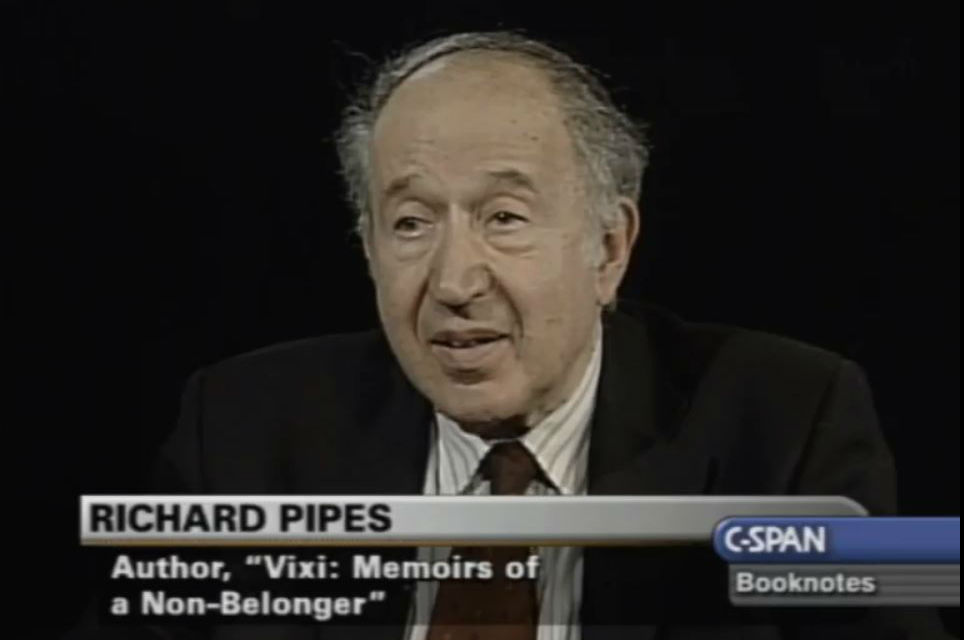 I was not a student of the late Richard Pipes, and I only met him once briefly, so I cannot claim any special relationship or unique insight into his personality and character. Nevertheless, he was and remains a model for historians of Russia and those who aspire to understand Russia as it really is. When I was writing my PhD dissertation on the Soviet Commissariat of Nationalities under Stalin, I spent the 1975-76 academic year at Harvard to utilize the unparalleled resources of the Widener Library. Upon entering the stacks, I found innumerable editions of essays from various Soviet Uchenye Zapiski (Notes from Learned Institutions, mainly pedagogical institutes). These small volumes often had one or more essay talking about how Soviet or Communist Party power was built in one or another province or autonomous republic of the USSR.
I was not a student of the late Richard Pipes, and I only met him once briefly, so I cannot claim any special relationship or unique insight into his personality and character. Nevertheless, he was and remains a model for historians of Russia and those who aspire to understand Russia as it really is. When I was writing my PhD dissertation on the Soviet Commissariat of Nationalities under Stalin, I spent the 1975-76 academic year at Harvard to utilize the unparalleled resources of the Widener Library. Upon entering the stacks, I found innumerable editions of essays from various Soviet Uchenye Zapiski (Notes from Learned Institutions, mainly pedagogical institutes). These small volumes often had one or more essay talking about how Soviet or Communist Party power was built in one or another province or autonomous republic of the USSR.
For all their obscurity, these works revealed an immense amount about the construction of the party and state. They shone a glaring light upon what would otherwise have been arcane and unknown processes of the actual building of the Soviet state. Yet despite their value, only one person had read them, namely Professor Pipes. And this was years after his path-breaking first book, Formation of the Soviet Union, a work that remains an unsurpassed classic sixty-five years after its initial publication. In other words, Pipes had done his homework before writing his book and for years afterward. He profoundly knew whereof he wrote and spoke. And this deep well of knowledge, aligned with a passion for the truth, was the bedrock upon which his initial and subsequent works were built. It is not for nothing that his history of The Russian Revolution remains a seminal account of that milestone in world history, even if those who profess a lingering admiration for socialism cannot bring themselves to accept the full scope of the catastrophe that this revolution wreaked upon Russia and the world. Likewise, his classic Russia Under the Old Regime serves students, professors, and laymen as a revealing and still correct paradigm of the evolution of the Russian state, a paradigm that lives on and has been reinvigorated under Vladimir Putin.
A lasting commitment to research and to the truth are the indispensable tools of a great historian, and here Pipes possessed them both. He remains a model to which all students of Russia or anywhere else should aspire. This is not to say he did not make mistakes. We all do. But his critics missed the point and do so now. Our mission is, pace Spinoza, neither to laugh or to weep at Russia, but to understand it. One of my teachers, whom I still revere, complained that Pipes did not love the Russian people. Whatever the qualities of individual Russians are, one cannot love a whole people, nor is it our task as researchers to love the Russian people. Rather, our task is to understand them and their system of government. And that task remains no less essential today in the face of the systematic dissemination of pro or anti-Russian nonsense from all sides of the political and academic spectrums.
The steadfast search for truth regardless of its utility is what should drive historians. Neither a commitment to nor against socialism or to or against Russia is what we should be about. Rather we should keep aiming at a deep understanding with the readiness to call out both good and evil. Pipes’ detractors fail to grasp that his insight into Russia led him to understand that the Kremlin will not surrender its craving for great power status and standing anytime soon. Moreover, he fully understood that it was quixotic to hope for that. But he understood what remains the truth: demand for empire means perpetual repression, conflict, and autocracy if not war.
It is a lonely task to stand between the opposing polarities of today’s politicized academic and public discourse. Nevertheless, Pipes’ historical works reflect his unwavering commitment to the task of impartial but hardly disinterested understanding, and his memoir, VIXI: Memoirs of a Non-Belonger, demonstrate the courage it took to take principled and unpopular stances in government and academia. In the final chapter, he concludes, “Concerning myself, reviewing the nearly eighty years I have lived through, I cherish my independence, the uncompromising right to be myself in word and deed. I consider my beliefs and opinions to be as much of me as my body: they are me in the liberal if nonphysical sense of the word,” and admitted that his insistence on this point had gotten him into trouble many times. Academia and scholarship, to say nothing of Russian studies, would be far better off if we all possessed Pipes’ iconoclastic but joyful spirit.
Stephen Blank is a senior fellow at the American Foreign Policy Council. He is the author of numerous foreign policy-related articles, white papers, and monographs focused on the geopolitics and geostrategy of Russia and Eurasia. He is a former MacArthur Fellow at the US Army War College.
Image: Harvard historian Richard Pipes appears on C-SPAN's Booknotes with Brian Lamb on November 19, 2013. Credit: Courtesy Screenshot
